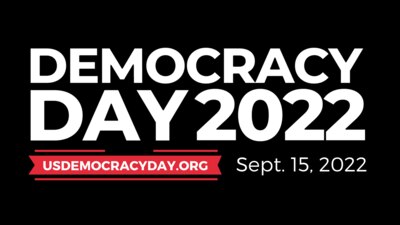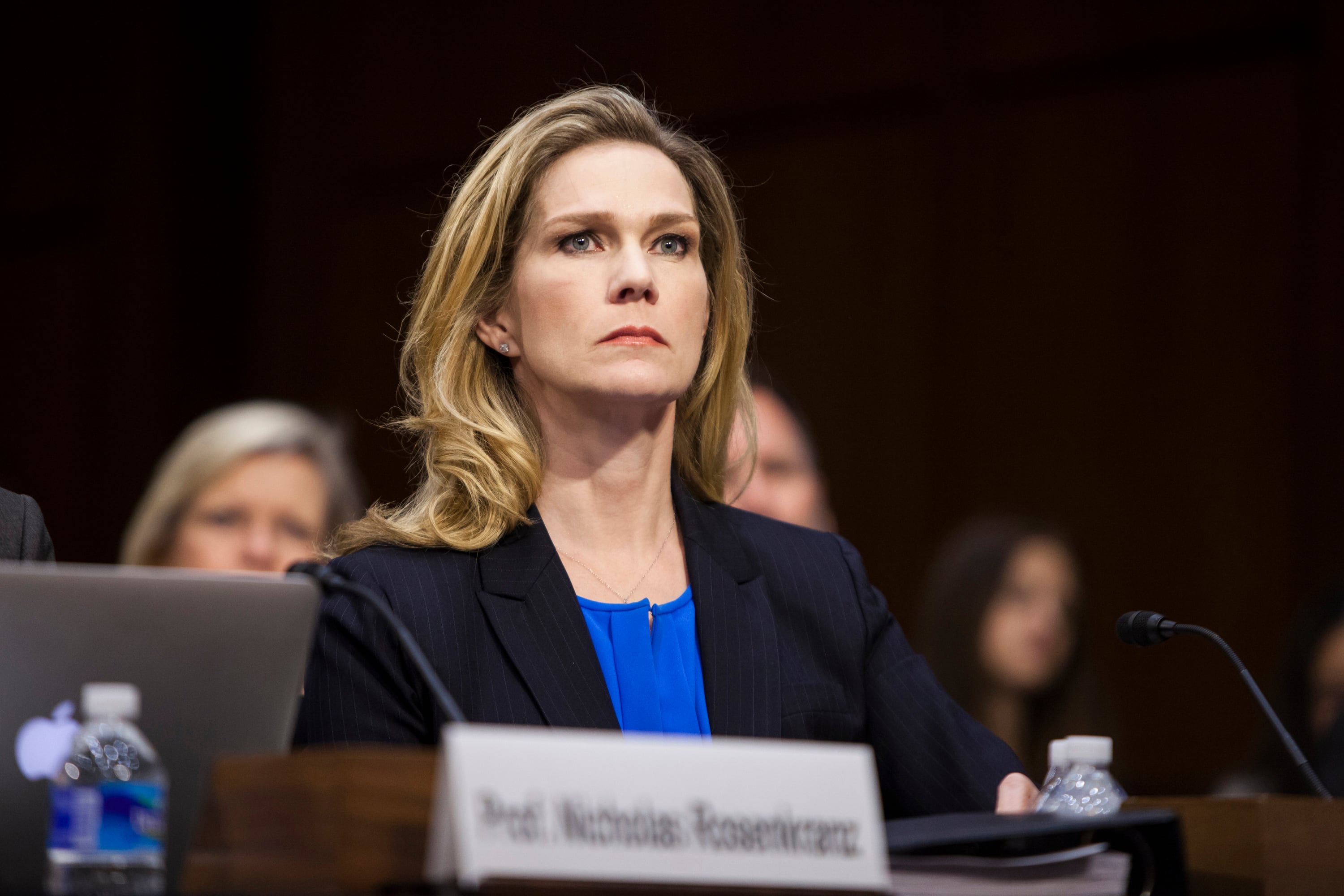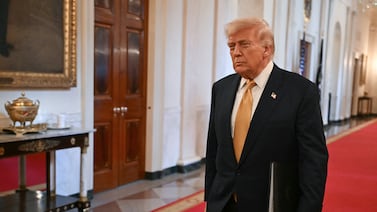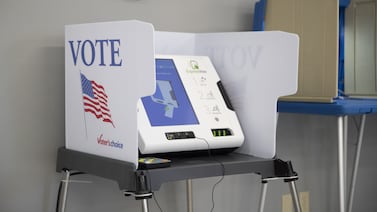This story was produced as part of the Democracy Day journalism collaborative, a nationwide effort to shine a light on the threats and opportunities facing American democracy.
A defamation and computer fraud lawsuit filed this week against Texas-based True the Vote asks a judge to essentially determine whether the election-integrity group’s campaign against a small election vendor constitutes slanderous lies or a participation in criminal acts.
The suit was brought by Konnech Inc., a small elections logistics company based in Michigan. It alleges that True the Vote and its followers launched a stream of false and racist accusations against the company’s founder, forcing him and his family to flee their home in fear for their lives and damaging the company’s business. The suit cites True the Votes’ public claims that it hacked the company’s servers and accessed the personal information of nearly 2 million U.S. poll workers.
In a rare move, the judge granted Konnech’s request for a temporary restraining order against Catherine Engelbrecht and Gregg Phillips, leaders of True the Vote, a nonprofit organization known for making allegations of voter fraud without evidence to support their claims. Judge Kenneth Hoyt of the U.S. District Court for the Southern District of Texas found a “substantial likelihood” that Konnech would “suffer irreparable injury” without it. The order also prohibits True the Vote from accessing, or attempting to access, Konnech’s computers or disclosing any of the company’s data and orders the group to disclose more information about the alleged breach.
Experts told Votebeat the damage done through the spread of conspiracy theories about election software companies such as Konnech by groups like True the Vote could impact the already limited tools available that help election officials hire, train and schedule election workers.

True the Vote has for years claimed that voting machines are not secure and that U.S. elections are increasingly fraudulent but has offered little evidence, and its claims have failed to stand up to basic scrutiny. Konnech’s lawsuit specifically names Engelbrecht, True the Vote’s founder, and Phillips, a board member, saying that they “have intentionally, repeatedly, and relentlessly attacked” Konnech, and its founder, Eugene Yu, with a “unique brand of racism and xenophobia.”
Engelbrecht and Phillips, for example, repeatedly called Yu a “Chinese operative” who was spearheading a “Red Chinese communist op run against the United States.”
“On August 27, 2022, True the Vote posted an article claiming that Konnech is ‘owned by the Chinese Communist Party,’ even though Konnech is owned by U.S. citizens who are not affiliated with the Chinese Communist Party, and claiming that Konnech is involved in the ‘subversion of our elections’ which is tantamount to falsely accusing Konnech of election fraud, treason, and espionage,” the complaint states.
True the Vote named its campaign targeting Konnech and Yu the “Tiger Project.”
In a text message to Votebeat on Tuesday, Engelbrecht said “True the Vote looks forward to a public conversation about Konnech’s attempts to silence examination of its activities through litigation.”
Hours after Engelbrecht was served with the lawsuit Monday, she took to social media to tell her followers about how they can prepare for an “honest election” in November. But first, she announced True the Vote had been sued and reassured the nearly 1,600 viewers who tuned into a livestream on the crowdfunding site Locals that allegations made by Konnech Inc. are “meritless.”
“We’re going to keep moving forward. Everything we have ever said about any of this is true,” Engelbrecht said during the hour-long livestream she hosted from a hotel room in Washington, D.C., where she encouraged viewers to sign up as poll watchers and to monitor drop boxes. “And it’s just a function of how we find our path to release it publicly in a way that allows us to keep moving forward.”
To date, no proof of widespread voter fraud has been found and True the Vote has not released any evidence of such fraud.
The fact that a federal judge granted the temporary restraining order under the case’s circumstances is significant, said Peter Vogel, a Texas litigation attorney who specializes in cybersecurity and information technology. Federal judges rarely grant injunctions without allowing a defendant to present evidence, he said.
“So that tells me that there must be very persuasive evidence for a federal judge to grant a temporary restraining order without having the other side be present,” Vogel said
Vogel also has decades of experience as a computer programmer and has examined electronic election systems for the Texas secretary of state’s office.
Another significant aspect of the order, he said, is the relatively low level of bond the judge required Konnech to post: just $100. The bond usually protects the enjoined parties from any damage.
“This tells me the judge doesn’t think there’s any damage to the defendant.” Vogel said.
True the Vote’s “Tiger Project” consisted of filing dozens of public record requests to Konnech’s customers, “all in an apparent effort to intimidate those customers or to otherwise raise customers’ suspicions about Konnech,’’ according to the company’s complaint.
In addition, the complaint says, True the Vote, Engelbrecht, and Phillips “falsely claimed” they discovered Konnech had stored data on an unsecured server in Wuhan, China, “which Defendants hacked into and stole data from,” including personal data on 1.8 million poll workers “which they claim is a vehicle for the Chinese Communist Party to breach U.S. elections.”
The company said it uses no such server, and stores all U.S. data “exclusively on protected computers located within the United States.” In addition, it said, it does not have data on that many poll workers “or even a small fraction of that number.”
“When [True the Vote] claimed to have illegally accessed Konnech’s system, the software was being used to manage poll worker recruitment and scheduling by 17 cities and counties (no states),” Jon Goldberg,* a spokesman for Konnech, said in an emailed statement to Votebeat.
Konnech’s only Texas client is Travis County, which uses the company’s PollChief tool to recruit, train and schedule poll workers.
According to the complaint, Konnech “does not select, communicate, or otherwise interface with any poll workers.” Konnech also argues that it “never handles any ballots and no ballots or other voting counts ever enter any of Konnech’s computer servers.”
Experts say the claims and conspiracy theories spread by groups like True the Vote about small companies such as Konnech, which offers a software that election officials can use to train, recruit and schedule poll workers for an election, could negatively impact election offices and ultimately voters and taxpayers.
The market for technology available to help support elections is already very small, said Tammy Patrick, election administration expert and senior advisor at Democracy Fund. There’s typically only a handful of election support software available for election administrators. Additionally, the shepherding of hundreds and sometimes thousands of election poll workers to get hired, trained and scheduled to work can be a huge task that requires a lot of time, staff and additional resources, she said.
“Software like the one this company provides, removes all of that back and forth and allows for a more streamlined, more efficient process,” Patrick said.“And so when you have a situation like this, that is infringing and slowing down, and making the hiring of poll workers less efficient in a time when it’s already a huge challenge. It can be incredibly problematic.”
The right-wing nonprofit organization has spearheaded the spread of voter fraud conspiracy theories in Texas and beyond. Earlier this year, Engelbrecht teamed up with conservative commentator Dinesh D’Souza to produce the documentary film “2000 Mules”. The movie aims to expose voter fraud in the 2020 election, which has been repeatedly debunked and criticized. The organization has also partnered with conservative sheriffs across the county to increase surveillance of voting and to help in investigating voter fraud allegations.
According to the lawsuit the “attacks” on Konnech began with “The Pit,” a True the Vote, invitation-only event in August, which was also live streamed, where Engelbrecht and Phillps would finally release “devastating information” that would prove the 2020 election was stolen.
“Instead, Defendants used The Pit as a platform to announce their website, and publicly launch their attack against Konnech by spreading baseless lies,” the lawsuit claims.
The “smearing campaign” against Konnech continued with True the Vote followers associating the otherwise unknown company to “everything from Mark Zuckerberg, to George Soros, the Chinese Communist Party, and even the origins of COVID-19,” the lawsuit states.
The complaint lays out True the Vote’s conspiracy theories about Konnech, which read like a cyber thriller.
Speaking on a podcast titled “Prophets and Patriots,” Phillips described meeting his “guys” at a hotel room in Dallas, where they put “towels under the doors” like “some kind of a James Bond kind of thing,” and proceeded to hack into a Konnech server, according to the complaint, which included a copy of the podcast.
Konnech’s complaint is another example of several ongoing lawsuits that allege that “individuals are knowingly and intentionally putting out misinformation as a way of making money and accumulating power,” said David A. Schulz, Yale Media Freedom and Information Access Clinic director.
Other election tech companies, such as Dominion and Smartmatic have filed defamation, libel and slander lawsuits against groups and allies of former president Donald Trump who echoed his false claims about 2020 election fraud, including Fox News and lawyers Rudy Giuliani and Sidney Powell.
In Georgia, two election workers filed a defamation lawsuit against cable news channel One America Network over debunked claims that the election workers had brought suitcases filled with illegal ballots while working as ballot counters. The lawsuit was resolved with a settlement in May.
“This is not the first case where this spread of false information has caused people to make death threats, and that has required people to leave their homes,” Schulz said. “This misinformation not only damages reputations, but it has real effects on people’s lives and companies causing grave damage, and bringing a claim for libel is one of the few tools that companies have to fight back.”
A hearing on Konnech’s case is scheduled for Sept. 26 in U.S. District Court in Houston.
*Correction, Sept. 15: A previous version of this story gave an incorrect name for Konnech’s spokesman. His name is Jon Goldberg.
Natalia Contreras is a reporter for Votebeat in partnership with The Texas Tribune. Contact Natalia at ncontreras@votebeat.org.






